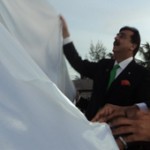Telemedicine is a combination of medical and telecommunication equipment that allows doctors to examine patients hundreds of kilometres away, usually with the assistance of a trained nurse at the patient’s end.
The Maldives’ first telemedicine facility was donated by Dhiraagu in late December 2010, and installed on Thinadhoo in Gaaf Dhaal at a cost of Rf 2 million (US$155,000). Further services are to be rolled out to Kudahuvadhoo (Dhaal Atoll), Eydhafushi (Baa Atoll), Naifaru (Lhaviyani Atoll) and eventually the southern atoll of Fuvahmulah, in a Rf 5.8 million (US$450,000) joint project between the government and the UAE-based Khalifa Al Nahyan Foundation, and will ultimately service 35 islands across the country.
Technologically ‘telemedicine’ ranges from two laptops and a webcam with a consulting doctor at one end and nurse at the other, to set-ups involving remote diagnostic equipment capable of compressing and sending complex medical imaging data across low-bandwidth connections – a challenge in many isolated areas with poor connectivity. Such deployments are seen as a practical application for unified communications technology developed by networking giants such as Cisco and Polycom, and is used all over world to supply medical expertise in remote and isolated communities in places such as Africa and Australia.
The particular system donated by Dhiraagu includes a cart consisting of a general exam camera, digital electronic stethoscope, dermascope, ENT otoscope, telephonic stethoscope, digital spirometer, 12 lead interpretive ECG, and digital vital signs monitor.
“Many patients currently need to travel to their regional hospital or Indira Gandhi Memorial Hospital (IGMH) in Male’. With telemedicine, a health assistant and a consulting hospital can mean the patient avoids having to travel long distances and gains increased access to medical care. And the doctor at the other end can be anywhere in the world.”






A big thank you to Dhiraagu for their generous donation. The same goes for the Khalifa Al Nahyan Foundation who are helping our poor islands.
I do hope that the equipment donated by generous donors are properly used and that we have well trained staff who can use and service them.
In the past, such endeavours didn't succeed due to the lack of adequately trained staff both in the use of the equipment and their repair. It's very important that when equipment break down as they inevitably will, we have local expertise to help repair them in a timely manner.
It will take time for patients to get used to this. It's unfortunately very common amongst Maldivians to want to go the hospital even for a minor cold! They have the desire to see a DOCTOR to even get a paracetamol. It will take time to change this attitude and that will have a huge impact on the provision of health care in the country.
I remember that a visiting British medical consultant made similar observations about the Maldivian health care system. We don't really have a community based primary health care system.
Veterinary telemedicine is already introduced in the Maldives, as I have offered my assistance to pet owners - particularly cat owners from my home practice in Denmark via skype (camera) e-mail and telephone. A veterinary nurse in Malé has helped me. It may not be as sophisticated as the medical telemedicine reported, but better than nothing
Søren Nielsen, veterinary surgeon
what ever it is, people of Maldives will visit India,or Srilanka,or Thailand or Singapore for medical treatment cum tourism depending upon their capabilities and resources,
Great initiative and an excellent support by Dhiraagu. We appreciate Dhiraagu's social coned intributions made to the country over the years. We always see Dhiraagu involved in matters that benefits Maldivians.
Dear Donors
We are pleased welcome to those who would like to support Telemedicine equipments and knowledge for the poor and remote areas people of Nepal. We are very much interested to implemented the project. Janamaitri Hospital is non for profit 100 beds Hospital centerely located Kathmandu Nepal.